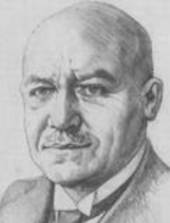Alfons Mauser
Alfons Mauser (born May 25, 1872 in Oberndorf am Neckar , † August 11, 1927 in Cologne ) was a German entrepreneur.
life and work
Mauser was born in Oberndorf am Neckar in 1872 as the second oldest of a total of six children of the Swabian inventor Wilhelm Mauser , a co-owner of the Mauser rifle factories . Alfons was 10 years old when his father died in 1882. After an apprenticeship that led him to all areas of the rifle factory, his uncle Peter-Paul Mauser sent him to England in 1891 and later to the United States , where he studied production techniques at Pratt & Withney and Remington Steel, among others .
After his return in 1893, Alfons Mauser completed his apprenticeship and studied at the Technical University of Stuttgart until March 1896 . His uncle Paul only used him in a subordinate position in the company and rejected his nephew's suggestions for improving the firing pin design on the Mauser rifle, which led to a falling out between the two. At the age of 24, Alfons Mauser founded a factory for sheet steel goods in 1896, which he now called "Para Pacem" ( prepare (for) peace ), as opposed to the weapon brand name "Para Bellum" ( Latin for preparing (for) war ) . called. The factory manufactured steel bars, garden gates and fence elements based on Mauser's patents, which he sold under the name “Wren”.
In 1898, Alfons Mauser relocated the company headquarters to Cologne-Ehrenfeld with the help of his father-in-law . In addition to the “Wren” products, from 1900 onwards he also manufactured baskets made of steel strip, which were required for the transport of bellied glass balloons in which liquid chemical preliminary products such as acids were transported. In 1903, Mauser also developed airtight lockable steel drums made of sheet iron for the chemical and petroleum industry, which became famous under the name of "Mauser patent barrels".
In 1921 Mauser acquired a former carbide factory in Waldeck , Hesse , which he redesigned with production lines for steel drums. The company flourished and became one of the largest employers in the region. Soon gas cylinders, containers, tanks and a wide variety of agricultural products were also manufactured here. In 1922 Mauser moved the company headquarters from Cologne-Ehrenfeld to Brühl in the Rhineland and renamed the company to Mauser-Werke GmbH .
Alfons Mauser died in 1927 at the age of 55 and was buried in Cologne's southern cemetery. His sons continued the business of the company in the form of a family holding company.
Private
Alfons Mauser married Maria Zwick-Sieber, who also came from an entrepreneurial family, in 1897. The union produced five sons. The Alfred and Maria Mauser Foundation was dedicated to supporting plant employees and their families.
Honors
The Technical University of Stuttgart awarded Alfons Mauser an honorary doctorate (Dr.-Ing. Eh).
literature
- Robert Steimel: Cologne heads. Steimel, Cologne 1958.
Individual evidence
- ↑ a b c Mauser round-shaped furniture. In: treffpunkt-kunst.net
- ↑ Alfons Mauser's tomb . In: findagrave.com
- ↑ Personal details . In: Heinrich Bechhold (ie Jacob Heinrich): The look around. Research, development, technology. H. Bechhold., 1922, p. 238.
| personal data | |
|---|---|
| SURNAME | Mauser, Alfons |
| BRIEF DESCRIPTION | German entrepreneur |
| DATE OF BIRTH | May 25, 1872 |
| PLACE OF BIRTH | Oberndorf am Neckar |
| DATE OF DEATH | August 11, 1927 |
| Place of death | Cologne |
